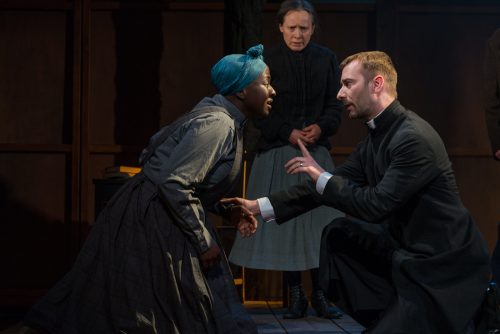Theatre review: The Crucible – Opera House, Manchester

Arthur Miller’s masterpiece ‘The Crucible’ has returned to Manchester as part of its 2017 tour directed by Douglas Rintoul.
Based in various domestic locations around the town of Salem, the message of the play is the toxicity of rumour and how disruptive it is in society.
Just as Miller made links between 1950s America and the country 260 years earlier, his message is still relevant in the modern world.
This play, which centres around the hysteria of the Salem witch trials in the early 1690s, eerily echoes the hysteria of modern day ‘witch-hunts’ of minority groups.
Miller’s writing of the play in 1953 took place during a period of political unrest, when McCarthyism was rife and the US government played a part in the ostracism of communists.
It is generally believed that in The Crucible, the witch hunts of the late 17th century are an allegory for this historic era in which Miller was writing.
On stage, it isn’t loneliness or vulnerability that is highlighted, but the suffocating nature of a society where everyone believes they are involved in each other’s business yet know so little.
The shining presence on stage in this production is the play’s protagonist, John Proctor, played by Eoin Slattery.
John Proctor, famous for his passionate, argumentative nature, captures the audience with his likeable character, despite having an affair with the play’s antagonist, Abigail Williams.
His wife, Elizabeth, is wrongly accused of witchcraft in the play and her husband fights to prove her innocence, even putting himself at risk.
Just as Rintoul, this play’s director, worked on the basis that ‘this play is for now’, it really is a story based on post-truth, alternative facts and ‘fake news’.
The accused witches are told if they accept their guilt, they would be spared jail and this is the case for some of the characters. This echoes 1950s America in which supporters of McCarthyism were also told if they accepted their guilt, they may also be spared prison.
This play, despite its length and complexity, is worth going to see if you want a captivating and eerie example of how history repeats itself and human nature is largely unchangeable.
Many people where unsure as to why it had been set in England despite being so deeply rooted in American history, but if you can get past that, it is an exceptional performance.








